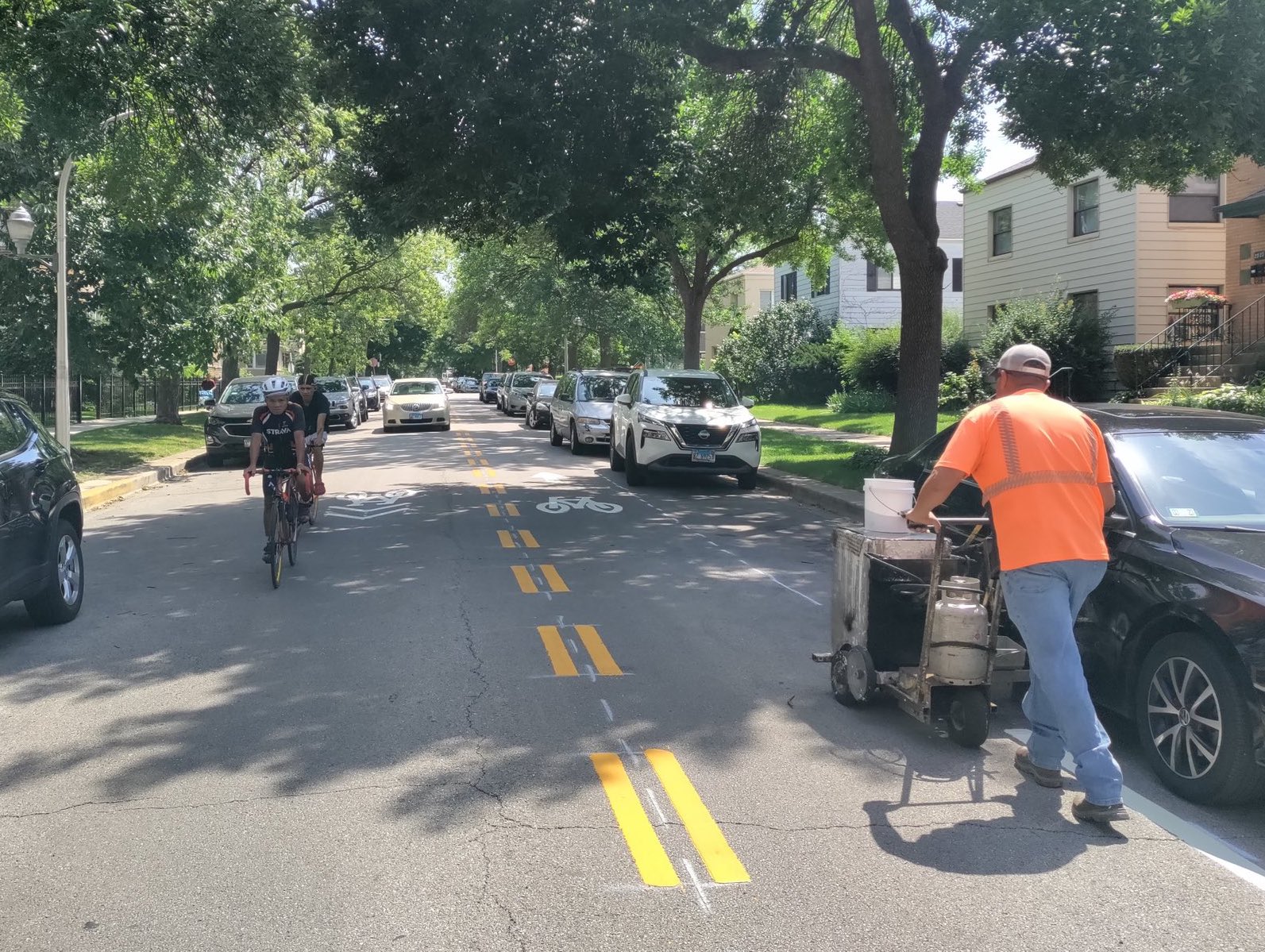Last Tuesday the Chicago Department of Transportation announced the completion of the Berwyn Avenue Neighborhood Greenway in Lincoln Square. This lower-stress bike route was striped on Berwyn (5300 N.) between Western Avenue (2400 W.) and the North Shore Channel Trail, which is located on the east bank of the channel (about 3000 W.)
Since this stretch of Berwyn is one-way westbound, an eastbound contraflow ("wrong-way") bike lane was added to make the route two-way for people on bikes. Berwyn, which is a residential street, has a stoplight at Western, and it's also one-way westbound between Western and Broadway (1200 W.) That segment lacks bike facilities.
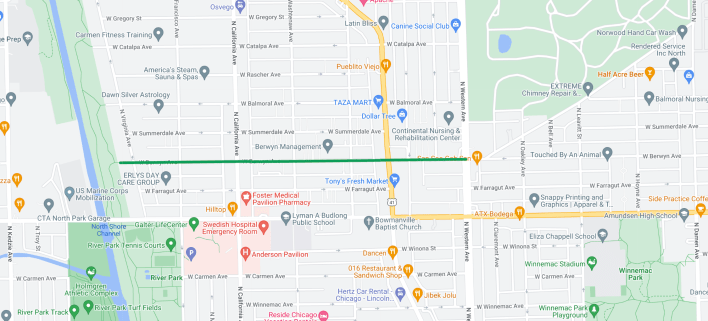
I checked out the new Neighborhood Greenway on Thursday evening around 4 p.m. Initially I was nervous about riding on it as rush hour was starting, a time when more drivers could be on the road. But I figured the effectiveness of this type of bikeway should be judged during times with maximum bike and motor vehicle traffic.
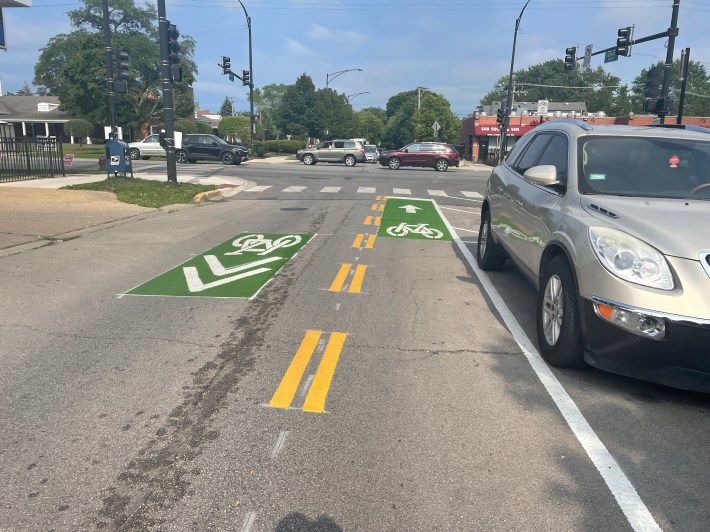
My biggest takeaway was that while the Berwyn Greenway has street markings and a newly lowered 20 mph speed limit, it needs additional traffic calming elements that are already found along other Neighborhood Greenways. For example, the Glenwood/Greenview Greenway, which runs between Evanston and Uptown has lots of speed bumps: two per block on many stretches. While the bumps are a little annoying to bike over – especially the ones in a poor state of repair – they do help calm traffic. In contrast, I only noticed two speed bumps on the entire Berwyn Greenway route, although they have a bike-friendly "sinusoidal" design that's smoother to ride over.
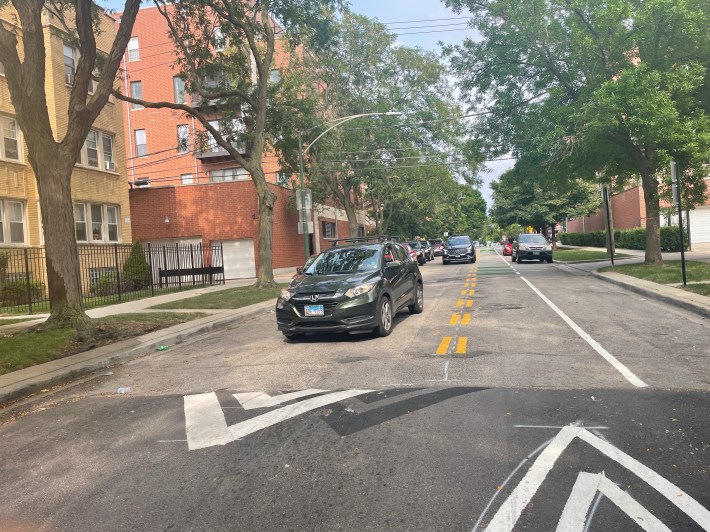
While riding east in the contraflow lane on Berwyn, I paid attention to how westbound drivers behaved around people cycling west. Many of these motorists tried to enter the contraflow lane to pass westbound cyclists. But because I was in the contraflow lane, they couldn't do that, so they instead passed the westbound cyclists with less than the three feet of passing room required by state law.
I wish I'd been able to ask those people on bikes how they felt about the drivers crowding their space. One of the riders was carrying a child and I was frustrated that motorists were in such a hurry that they wouldn't even slow down to wait for an opportunity to safely pass a person biking with a kid. And some of the drivers on Berwyn were definitely going faster than 20 mph. Again, all the speed humps on Glenwood make for a somewhat bumpy bike ride, but they do slow down motorists and discourage them from passing cyclists in an unsafe manner.
As is the case on many other Chicago streets, the new bike infrastructure on Berwyn leaves much to be desired. I understand the space constraints of placing the contra-flow bike lane against the curb if we continue to prioritize vehicle storage in the public way. In an ideal world one side of the street could be used for a protected bike lane and some limited loading zones for delivery vehicles and moving vans. There's a lot more we could be doing with our residential street space than just storing vehicles.
The new Berwyn Neighborhood Greenway, funded by @chicagosmayor’s #ChicagoWorks program, includes a contraflow bike lane and lowered speed limit of 20mph to help people biking to the North Shore Channel Trail. CDOT is working to extend the project east of Western Ave. pic.twitter.com/ndLE0m8xbu
— CDOT (@ChicagoDOT) August 2, 2022
In the tweet above post announcing the new greenway, the Chicago Department of Transportation said it's trying to extend the facility east of Western. I’m not holding my breath that they’ll turn parts of Berwyn into something resembling a Barcelona Superblock. But the stretch of Berwyn between Clark Street (1530 W.) and Winthrop Avenue (1100 W.) is wide enough to accommodate some street furniture like benches and maybe even mini play equipment.
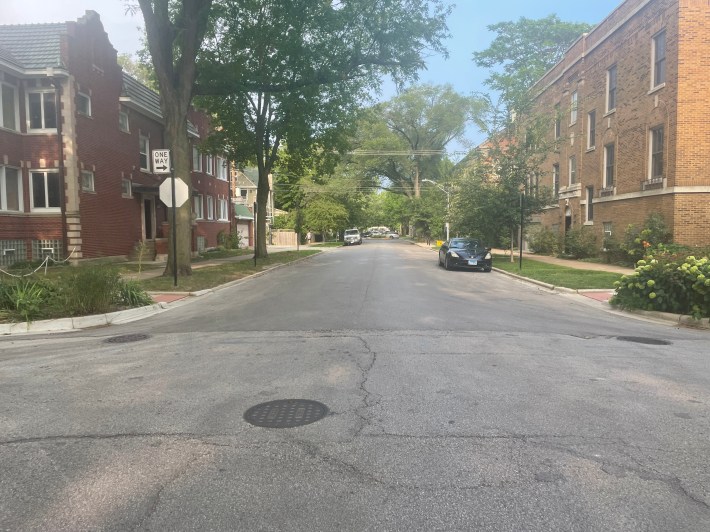
I often ride east on Berwyn between Broadway and Clark, and I’m amazed at how wide the street is and that relatively few curbside parking spaces are occupied. It’s such a waste that the city of Chicago doesn't yet see its residential streets as more than places for drivers to pass through and cars to be stored. But I hope residents will soon begin to demand our streets become places for socializing, play, and rest.
